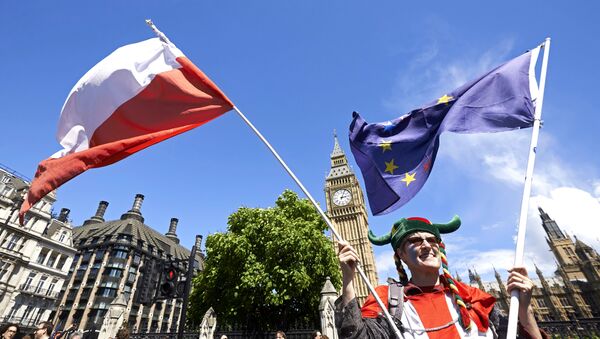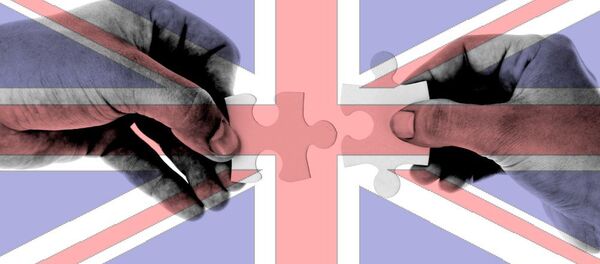The issue of immigration was widely believed to have been a significant factor behind June's unprecedented UK referendum result.
The message from the Vote Leave camp was widely touted as "Vote Leave, Take Back Control."
Now, official figures show that net migration — the difference between the number of immigrants arriving and the number of Brits moving overseas — is 327,000: triple the Conservative government's target.
And among the foreign nationals who live and work in the UK, for the first time, Poland has overtaken India as being the most common place for them to be born.

Madeleine Sumption, Director of the Migration Observatory at the University of Oxford told Sputnik:
"Traditionally the UK's relationship with Ireland and the former colonies have been key factors in shaping its migrant population. What we can see from current data is that in recent years the EU has played a similar role."
The number of residents born in Poland was 831,000 in 2015, whilst the Indian-born population stood at 795,000.
Poland was the most common country of birth for non-UK mothers in E&W in 2015, Pakistan for fathers https://t.co/r6P9s4niS9
— ONS (@ONS) August 25, 2016
EU citizens continued to make up just under half of net inflows of non-UK citizens, at 180,000, or 49%. The main reason for migration during this period was work, which was cited by 73% of EU citizens, but only 30% of non-EU citizens.
Chart — non-British citizens immigrating to UK with a definite job or looking for work https://t.co/qByMmURDKB pic.twitter.com/S1nOmXEXOI
— Paul Vickers (@PaulVickers_ONS) August 25, 2016
The figures are up to the year ending March 2016 — before the UK's referendum to leave the EU. It's not yet clear how the "exit" vote will affect immigrants who view the UK as an appealing destination to move to.
For those immigrants already here, it has led to a great deal of confusion over their status, and whether they will be allowed to continue to work, study and live in the UK.
"This data comes at a time of considerable uncertainty for EU migrants living in the UK, as most EU migrants are not UK citizens. Although the Government has committed in principle, to allow EU migrants to remain in the UK, there are many unresolved questions about their status.
"While high levels of EU migration were a major theme in the referendum debate, predicting how they will change after Brexit is still an impossible task. We don't yet know what policies will apply to EU citizens after Brexit. The impact of the referendum outcome on the economy — and thus, whether the UK will continue to be an attractive destination for migrants looking to work in the UK-also remains uncertain," Ms. Sumption told Sputnik.
However, before the UK referendum, the Migration Observatory noted that if the UK did vote to leave the EU, it's possible the entire immigration system may be need to be redesigned. Current immigration rules were developed in a context where free movement was a defining feature of the system.
Certainly, Prime Minister Theresa May is under pressure to indicate what her policy towards EU nationals is, and indeed, when she will start negotiations to leave the EU.
The UK government has yet to trigger Article 50 of the Lisbon Treaty, which is the necessary mechanism needed before official talks can even begin.
Despite demands from members of her own cabinet, May has refused to say when she will start the process.
In the meantime, the 590,000 EU nationals living in the UK must continue to wait for a sign of clarity from the UK government.
What Mrs. May has said, is that she thinks the target of reducing the net migration figure to less than 100,000, which was first introduced by her predecessor David Cameron, does represents a reasonable target. She has reaffirmed a commitment to reducing it following the Brexit vote.
The Prime Minister has also ordered officials to draw up a fresh package of immigration controls for non-EU migrants, considering work, family and student visas being potentially tightened.





